TODAY’S READING FROM THE OLD TESTAMENT- EZEKIEL 39:1- 40:27
 The over-ruling hand of God is seen as the Lord takes action in bringing judgment upon Gog, the chief prince of Meshech and Tubal. 85 percent of his army will be destroyed. The defeat will be so catastrophic that the bodies of the slain soldiers will become food for the birds of prey and wild animals. Verses 4-9 are similar to Revelation 19:17-18 and are obviously referencing the same event. Revelation 19 is at least a partial fulfillment of Ezekiel 39:4.
The over-ruling hand of God is seen as the Lord takes action in bringing judgment upon Gog, the chief prince of Meshech and Tubal. 85 percent of his army will be destroyed. The defeat will be so catastrophic that the bodies of the slain soldiers will become food for the birds of prey and wild animals. Verses 4-9 are similar to Revelation 19:17-18 and are obviously referencing the same event. Revelation 19 is at least a partial fulfillment of Ezekiel 39:4.
Ezekiel 39:4 4 “You will fall on the mountains of Israel, you and all your troops and the peoples who are with you; I will give you as food to every kind of predatory bird and beast of the field.”
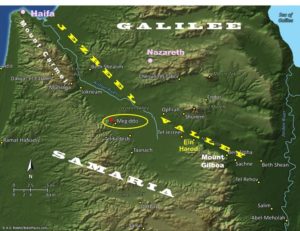 The battlefield is an open field near Mount Tabor, where the valley of Jezreel is located. This large valley, also known as the plain of Esdraelon and the valley of Megiddo, could serve as a suitable battlefield. This valley was identified by the apostle John as the battleground for Armageddon (Revelation 16:13-16).
The battlefield is an open field near Mount Tabor, where the valley of Jezreel is located. This large valley, also known as the plain of Esdraelon and the valley of Megiddo, could serve as a suitable battlefield. This valley was identified by the apostle John as the battleground for Armageddon (Revelation 16:13-16).
The name of the Lord will be vindicated by this judgment on Gog and the deliverance of Israel. All will know that He is the Holy One in Israel.
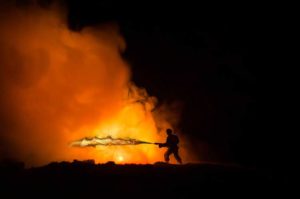 Ezekiel 39:7 7 “My holy name I will make known in the midst of My people Israel; and I will not let My holy name be profaned anymore. And the nations will know that I am the LORD, the Holy One in Israel.”
Ezekiel 39:7 7 “My holy name I will make known in the midst of My people Israel; and I will not let My holy name be profaned anymore. And the nations will know that I am the LORD, the Holy One in Israel.”
The burning of the weaponry will supply fuel for Israel for seven years (39:9-10). The huge valley will be required as a burial ground for the multitudes that are slain in the battle. It will take seven months to bury the dead.
After reading of Gog’s defeat, we are taken back to Ezekiel’s words to the exiles.
Ezekiel listed seven purposes of God that would be accomplished by His ending the exile.
- God would initiate a new era in His relationship with Israel, as indicated by the word, ‘now’ (v.25)
- God, in love, had disciplined His people, chastening them with the temporary defeat and captivity, and would now show compassion by restoring them to their land.
- God would be zealous for His Namesake, reversing the profaning of His Name and promoting the sanctification of His Name among the nations (Ezek 36:20-23).
- Israel would forget their time of shame and unfaithfulness, and their time of disgrace would be past (36:30-31).
- God would demonstrate His holiness through the regathering of His people from the countries of their enemies and restoring them to their land.
- Israel would know that Yahweh is their God as He leaves no man behind, bringing all back to the land.
Ezekiel 39:28 28 “Then they will know that I am the LORD their God because I made them go into exile among the nations, and then gathered them again to their own land; and I will leave none of them there any longer.”
- God would pour out His Spirit on the house of Israel as He has promised (Ezekiel 36:27; Joel 2:29, a promise associated with the Messianic age)
Ezekiel 39:29 29 “I will not hide My face from them any longer, for I will have poured out My Spirit on the house of Israel,” declares the Lord GOD.
Lamar Eugene Cooper writes in the NAS commentary:
“Yet those who think that Pentecost is the final fulfillment of this prophecy and that the church has replaced Israel in the plan of God must reckon with the stress of these chapters on the need for an eschatological vindication of God’s name in His dealings with Israel. These prophecies call for Israel’s literal return to the land in peace and prosperity, followed by the threat of massive invasion and a spectacular annihilation of Israel’s enemies. Only then will the revelation of the uniqueness and glory of God be complete and will the purpose of Israel as a light to the nations be fulfilled.”
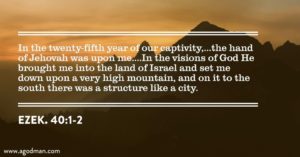 Ezekiel Chapter 40 begins the final section of prophecies concerning the realization of Israel’s hope– the people of God are restored spiritually, morally, and physically. They are portrayed as worshiping the One True God in this restored place of worship.
Ezekiel Chapter 40 begins the final section of prophecies concerning the realization of Israel’s hope– the people of God are restored spiritually, morally, and physically. They are portrayed as worshiping the One True God in this restored place of worship.
These prophecies were given 12 years after the previous ones and are the last, with the exception of Chapter 29’s prophecy concerning the overcoming of Tyre by Nebuchadnezzar, which was given at a later date.
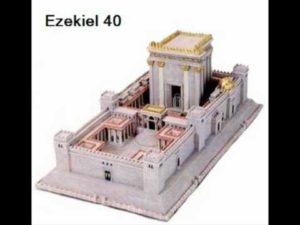 Chapter 40:1-42:20 contains the vision of the restored temple.
Chapter 40:1-42:20 contains the vision of the restored temple.
When I was in Israel, a Jewish woman explained a ‘built to scale model’ of Ezekiel’s temple that was on display in Jerusalem. She described this temple as ‘the belly of Jerusalem,’ and Jerusalem as ‘the belly of Israel’ and Israel as ‘the belly of the world’ (See Ezekiel 38:12).
Jesus stood up at the Great Day of the Feast and prophesied,
John 7:38-39 38 “He who believes in Me, as the Scripture said, ‘From his innermost being (‘belly’ -KJV) will flow rivers of living water.'” 39 But this He spoke of the Spirit, whom those who believed in Him were to receive; for the Spirit was not yet given, because Jesus was not yet glorified.
But are we to suddenly switch our entire interpretation of this prophecy to one that is non-literal, where up to now, all prophecies in this book have been taken literally, even though apocalyptic language has been used? I don’t think so.
Is this just Ezekiel’s dream of an ideal? Nothing in the post-exilic history of Israel has ever matched these predictions, and the rebuilt temple has never equaled the dimensions described. There are a variety of interpretations, but Ezekiel is told to record these details carefully, which gives us good reason to believe that they are to be taken seriously.
The One Year Bible Companion summarizes the four dominant views on this passage:
“The building of the temple envisioned a time of complete restoration to the exiles, a time when God would return to His people. A temple was built in Jerusalem in 520-515 B. C. (See Ezra 5-6) but fell short of Ezekiel’s plan (Haggai 2:3; Zechariah 4:10). This vision of the temple has been interpreted in four main ways:
- This is the temple Zerubbabel should have built in 520-515 B.C. and is the actual blueprint Ezekiel intended. But due to disobedience (Ezekiel 43:2-10), it was never followed.
- This is a literal temple to be rebuilt during the millennial reign of Christ.
- This temple is symbolic of the true worship of God by the Christian church right now.
- This temple is symbolic of the future and eternal reign of God when His presence and blessing fill the earth.
Whether the temple is literal or symbolic, it seems clear that this is a vision of God’s final perfect kingdom.
The argument against the view that Ezekiel’s temple is a literal building of the future is that sacrifices are mentioned (Ezekiel 40:38-43). If the sacrifices were to be reinstituted in the last days, then Christ’s final sacrifice would not have been final. The New Testament makes it clear that Christ died once and for all (Romans 6:10; Heb. 9:12; 10:10, 18). Our sins have been removed; no further sacrifice Is needed.
In Ezekiel’s day, however, the only kind of worship the people knew was the kind that revolved around the sacrifices and ceremonies described in Exodus through Deuteronomy. Ezekiel had to explain the new order of worship in terms the people would understand. The next nine chapters tell how the temple is the focal point of everything, showing that the ideal relationship with God is when all of life centers on Him. Ezekiel explained God’s dwelling place in words and images the people could understand. God wanted them to see the great splendor He had planned for those who lived faithfully. This kind of temple was never built, but it was a vision intended to typify God’s perfect plan for His people- the centrality of worship, the presence of the Lord, the blessings flowing from it, and the orderliness of worship and worship duties.”
I would caution that there are weaknesses in spiritualizing these passages. Such interpretations fail to give an account for the people, places, and events, as well as the great detail that the angel of God told Ezekiel to carefully take note of. We will explore some of these details in further readings.
TODAY’S READING FROM THE NEW TESTAMENT – JAMES 2:18- 3:18.
 James contrasts the pseudo-Christian with the real Christian. The pseudo-Christian has a profession of faith. A true believer has the possession of faith. Faith is more than an intellectual assent to the reality of Who God is and what He has done. James declares, “Even the demons believe that- and shudder.” No. A living faith is empowered by the Spirit to bring about a transfer of trust to the perfections of Christ, who produces in us the desire to render to God obedient action.
James contrasts the pseudo-Christian with the real Christian. The pseudo-Christian has a profession of faith. A true believer has the possession of faith. Faith is more than an intellectual assent to the reality of Who God is and what He has done. James declares, “Even the demons believe that- and shudder.” No. A living faith is empowered by the Spirit to bring about a transfer of trust to the perfections of Christ, who produces in us the desire to render to God obedient action.
Living Faith will be manifested by the fruit of faith- deeds (James 2:18-26). We are saved by grace through faith, not by works, lest any man should boast. This gift of salvation brings the life of God into the soul of man and will energize the production of spiritual fruit. Living faith will enable believers to produce works that God has before ordained that they should walk in (Ephesians 2:10).
James warns against those who desire to teach, but are not themselves subject to the Word (James 3:1-2). He warns those who presume to be spiritual yet have need to submit their tongues to the control of the Holy Spirit (James 3:3-12).
Some can pretend to be wise, and yet their wisdom is earthly, unspiritual, and of the devil. Those who are truly wise, James says, are those who have been made right with God through faith in Christ and have the fruit of righteousness being reproduced in their hearts. There is no possibility of peace apart from righteousness. Here when James says that the wisdom from above is first pure, it is pure righteousness. Then it is peaceable, considerate, submissive, full of mercy and good fruit, impartial and sincere.
Peace does not produce righteousness. Righteousness produces peace and peacemakers.
Isaiah 32:17 17 And the work of righteousness will be peace, And the service of righteousness, quietness and confidence forever.
Romans 14:17 17 for the kingdom of God is not eating and drinking, but righteousness and peace and joy in the Holy Spirit.
TODAY’S READING FROM THE BOOK OF PSALMS- PSALMS 118:1-18
 Psalm 118 is the last in the series of songs known as ‘The Hallel’. These songs of praise and thanksgiving were sung on the holidays, and this Psalm was sung by Jesus and the disciples after the Last Supper before He moved out to the Mount of Olives. It calls forth praise for one reason: His love (chesed-mercy, lovingkindness, covenant-love) endures forever!
Psalm 118 is the last in the series of songs known as ‘The Hallel’. These songs of praise and thanksgiving were sung on the holidays, and this Psalm was sung by Jesus and the disciples after the Last Supper before He moved out to the Mount of Olives. It calls forth praise for one reason: His love (chesed-mercy, lovingkindness, covenant-love) endures forever!
This is the song of the redeemed. God has set us free (v. 5); Whom should we fear? (v.6) We have His presence, His help, His company, His victory (v.7).
Imagine the Lord Jesus singing this Psalm on the night that he was betrayed.
Psalm 118:8-9 8 It is better to take refuge in the LORD Than to trust in man. 9 It is better to take refuge in the LORD Than to trust in princes.
He was going to the cross to ‘cut off’ all the power of the enemy (v.10-12).
His trust was in the Father, His help, His strength, His song, and His salvation (the one who would raise Him from the dead).
We who are beneficiaries of His redemptive work can sing from our tents:
 Psalm 118:15-17 15 The sound of joyful shouting and salvation is in the tents of the righteous; The right hand of the LORD does valiantly. 16 The right hand of the LORD is exalted; The right hand of the LORD does valiantly. 17 I will not die, but live, and tell of the works of the LORD.
Psalm 118:15-17 15 The sound of joyful shouting and salvation is in the tents of the righteous; The right hand of the LORD does valiantly. 16 The right hand of the LORD is exalted; The right hand of the LORD does valiantly. 17 I will not die, but live, and tell of the works of the LORD.
Here is a psalm that holds on to the promise of resurrection life!
TODAY’S READING FROM THE BOOK OF PROVERBS- PROVERBS 28:2
Proverbs 28:2 2 By the transgression of a land many are its princes, but by a man of understanding and knowledge, so it endures.
A law-breaking people of the land look to lawless leaders. They lead society to ruin. But only one man is needed, a man of understanding and knowledge, to cause a land to endure.
This is a reminder of the power of one and should encourage us all to our individual responsibility to promote the godly welfare of our nation. But it also is a reminder that Christ Jesus, the God-man, is the indispensable ingredient for our eternal well-being.
PRAY FOR THE NATIONS – THAILAND
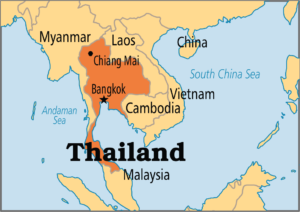 Join with this sister in Christ as she prays for her country of Thailand. https://prayercast.com/thailand.html
Join with this sister in Christ as she prays for her country of Thailand. https://prayercast.com/thailand.html
Turquoise waters, beautiful beaches, traditional floating markets, and a rich and friendly culture combine to make Thailand a major tourist destination and travel hub for southeast Asia. In fact, over 10% of the nation’s GDP comes from the tourist industry. Towering golden Buddha figures and sparkling Buddhist temples draw the eyes of many and demonstrate Thailand’s deep spirituality. This country is also magnificently diverse. Its landscape varies from busy cities to rice paddies, tropical forests, and little rural villages. There are also over 100 distinct people groups among its 69 million people.
Thailand means “land of the free,” yet it is home to many who live in bondage. Despite a relatively stable and industrialized economy, sex trafficking, drugs, and organized crime are rampant. It is estimated that over 425,000 people are living in slavery, and approximately three to four million migrant workers are forced into labor or sex trafficking. Thailand is a destination for sex tourism and is considered a tier two country – meaning it doesn’t meet the minimum standards of the Trafficking Victims Protection Act. Under the rule of a constitutional monarchy since 1932, Thailand established a new king in December of 2016 who signed a new constitution in 2017. The nation has a history of military coups, and some have predicted that the constitution will give the military more control. In the midst of these political transitions, Thailand has declared its intention to return to a democratic system.
The fact that 99% of Thailand remains unreached by the Gospel is staggering. The Thai people are 85% Buddhist, 8% Muslim, and only .5% Evangelical Christian. With an overwhelming Buddhist majority, many Thai people are bound to an intricate belief system that mixes Buddhism, folk animism, and Occultism. Even after centuries of Christian missions, very few Thais follow Jesus, and the overwhelming majority of sub-districts have no church. Sound Biblical teaching is needed to combat false beliefs with a culturally sensitive Gospel presentation. Yet despite a lack of vision and leadership, the Thai Church is experiencing growth, and many leaders are rising up to reach all 80,000 villages.
PRAYER: Gracious Triune God, thank You for giving us the true metanarrative of human history. You are the Creator, Sustainer, and Redeemer. We see that history’s goal is to bring all things under the headship of Christ that You will be all in all. We pray that today You would advance Your purposes, that Your kingdom will come, and Your will be done on earth as it is in heaven. We praise You that one day Your Name will be hallowed among all the nations. Your kingdom rule has been inaugurated in our hearts by the new birth. We pray that we will joyfully submit to Your Word and Your Spirit and enter into Your choice purposes for our lives this day. In Jesus’ Name. Amen.
Pastor David
